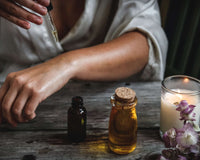CBD News

CBC: Your New Favorite Cannabinioid
As the world of hemp derived wellness grows beyond just CBD and THC, using cannabinoids such as CBC for pain and mood support, especially combined with other cannabinoids, is emerging as a potentially more...

Get Zen With CBD
Does your mind have a tendency to wander, or do you have trouble focusing? Well in this blog we talk about how CBD, CBN, and CBG may help make mediation a bit easier for you by calming the mind and body for a more smooth sailing session. If that is something you're interested in, definitely give this blog a read for more information. :)

New Wyld Ratio CBD Gummy Review
Discover CBD is excited to carry three varieties of Wyld brand CBD ratio gummies. These delicious gummies have been very popular recently, with the rise of ratio products and the wider recognition of minor cannabinoids such as CBG, CBN, and CBC. Wyld prides themselves on creating naturally made vegan gummies that are eco friendly and sustainably sourced. If you have not found much relief with other options, these ratio gummies might be the thing for you!

The Beginners Guide To THCA
In this blog, we will discuss the main differences between THCA and THC, the potential benefits, and common uses for them.

Treat Your Furry Friend Right With CBD
CBD has shown potential as a natural remedy for the care of pets, especially in the case of anxiety, chronic pain, convulsions, and problems of the skin and coat. Whether in the form of tincture oil or delicious treats it is a very warm-hearted way to look after your friends.

Everything You Need to Know About Our Full Spectrum CBD Tincture
In this blog, I will be exploring the fascinating and sometimes confusing world of full spectrum CBD, through my own experience with Active CBD Oil’s Unflavored Full Spectrum Tincture and research into Full Spectrum CBD. Drawing from weeks of experience using this product, I hope to clear up some misconceptions or answer questions you might have when considering full spectrum CBD options.

How CBD & CBN May Benefit PTSD Symptoms
Do you or a loved one struggle with the symptoms of PTSD? Well I'm hoping this blog may give you a bit a relief if you've been looking for something that may be able to help those symptoms. Not only does this blog touch on what PTSD is and how it affects your brain, it also touches on how CBD and CBN may benefit the symptoms that come with having PTSD. So, let's get informed!

Relax, Rejuvenate, and Discover Your Best Self with CBD Bath Bombs
CBD bath bombs may be one of the most relaxing and refreshing ways to use and take CBD. Many people share that they prefer to use CBD bath bombs for full body pain or intense stress.

Find Balance With Active CBD Chocolate
We live in a time where CBD can be found in many different forms. Since the proliferation of the hemp industry, manufacturers have been getting creative with different CBD products. With so many different products out there, finding the right method of consumption for CBD can be tricky. With so many great and effective ways to take it, finding what works best for you can be a journey. In this blog we’ll talk about CBD chocolate and how it could be just what you were looking for.

Can I Buy CBD Wholesale Online?
Whether you have an existing business and want to start carrying CBD products or you are looking into starting a new business in the wellness space, you may have some questions regarding CBD wholesale. Learn about the various wholesale CBD programs and wholesale cbd pricing today.

How To Make Your Own CBD Vape Juice








